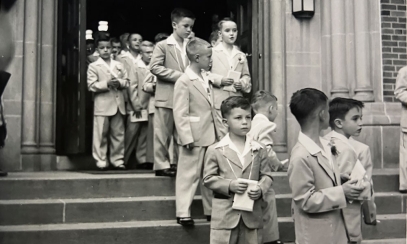
The Game of God
Some years ago, a student in my psychology class sighed in anguish, “Don’t make me think, just give me the answer.” Of course, this took me aback as a teacher, but especially because thinking is my hobby!
Some years ago, a student in my psychology class sighed in anguish, “Don’t make me think, just give me the answer.” Of course, this took me aback as a teacher, but especially because thinking is my hobby!
Lent, which rather quickly begins Feb. 22, marks the weeks of preparation and anticipation leading up to Easter. It offers a special time to think about religion. Indeed, a whole area of study exists called Philosophy of Religion, which is basically where religion thinks, speculates and philosophizes about its own beliefs.
St. John Paul II encouraged such activity in his encyclical, Fides et Ratio, Latin for faith and reason. Seminaries historically have taught theology (faith) and philosophy (reason). However, the pope-turned-saint felt that philosophy was not getting enough attention in recent years in seminaries and universities, and thus he called for its reemergence.
I decided to accept the good pontiff’s invitation to think about my religion, to reason about my faith.
The Game of God
With all due respect to the Almighty, trying to understand God is like playing an unfair game we have no chance of winning. We are commissioned to try to decipher the undecipherable, fathom the unfathomable, understand the incomprehensible. Clearly, we are not going to win this sacred game.
But the interesting part is that we are invited to try. We should not be afraid. It’s okay to question, speculate, imagine and philosophize. We don’t have to simply submit to faith alone — we are allowed, even encouraged, to think about our religion and our faith in God.
The players
Curiously, many refuse to play the game — they don’t even want to discuss the subject. They might say they don’t believe in God, or they simply don’t like to talk about it.
Others forfeit the game — they blindly believe whatever they are told and refuse to think or ask questions for themselves.
Still others take the game too seriously — such as ideological extremists and radical religious groups.
And then, there are those who delight in the game — they enjoy the challenge and are not afraid to play, like philosophers, theologians and regular folks like you and me.
Why a game?
St. John Paul II encouraged people of all religions and cultures, East and West, to come together in pursuit of a common core of beliefs and universal truth. He stated that all cultures have made contributions in advancing our understanding of God and our existence. Eloquently said, and indeed, a sacred and holy endeavor.
So, why call this pursuit a game? Because our culture understands games! We are encouraged to participate, they are accessible to everybody, healthy, fun and not reserved for a special elite. Games are viewed as contributing to our development, plus adding excitement and variety to our lives.
Shouldn’t the “Game of God” be viewed in much the same way — accessible, participative, healthy, even fun? And not reserved for a special elite like philosophers, theologians, academicians and the clergy.
God gave us the game, put us in the game and wants us to play it without worrying ourselves to death about possible blunders, misplays or poor strategies. We are to play as best we can and get as far as we can in understanding God, rather than sitting meekly on the sidelines worrying about losing or offending him or violating our religion. He wants us to get into the action and play the game until the kingdom comes, and then we can all find out how we did.
God is bigger than our questions, and our Church is older than our doubts.
Thomas Dorsel, Ph.D., is professor emeritus of psychology, and lives on Hilton Head Island with his wife, Sue. He is a parishioner at St. Francis by the Sea Church and cantor at Holy Family Church. Visit him at dorsel.com.



